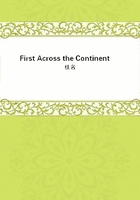
第3章
Beginning a Long Journey In 1803, availing himself of a plausible pretext to send out an exploring expedition, President Jefferson asked Congress to appropriate a small sum of money ($2,500) for the execution of his purpose.
At that time the cession of the Louisiana Territory had not been completed; but matters were in train to that end, and before the expedition was fairly started on its long journey across the continent, the Territory was formally ceded to the United States.
Meriwether Lewis, a captain in the army, was selected by Jefferson to lead the expedition. Captain Lewis was a native of Virginia, and at that time was only twenty-nine years old.
He had been Jefferson's private secretary for two years and was, of course, familiar with the President's plans and expectations as these regarded the wonder-land which Lewis was to enter.
It is pleasant to quote here Mr. Jefferson's words concerning Captain Lewis. In a memoir of that distinguished young officer, written after his death, Jefferson said: "Of courage undaunted; possessing a firmness and perseverance of purpose which nothing but impossibilities could divert from its direction; careful as a father of those committed to his charge, yet steady in the maintenance of order and discipline; intimate with the Indian character, customs and principles; habituated to the hunting life; guarded, by exact observation of the vegetables and animals of his own country, against losing time in the description of objects already possessed; honest, disinterested, liberal, of sound understanding, and a fidelity to truth so scrupulous that whatever he should report would be as certain as if seen by ourselves--with all these qualifications, as if selected and implanted by nature in one body for this express purpose, I could have no hesitation in confiding the enterprise to him."
Before we have finished the story of Meriwether Lewis and his companions, we shall see that this high praise of the youthful commander was well deserved.
For a coadjutor and comrade Captain Lewis chose William Clark,[1] also a native of Virginia, and then about thirty-three years old. Clark, like Lewis, held a commission in the military service of the United States, and his appointment as one of the leaders of the expedition with which his name and that of Lewis will ever be associated, made the two men equal in rank.
Exactly how there could be two captains commanding the same expedition, both of the same military and actual rank, without jar or quarrel, we cannot understand; but it is certain that the two young men got on together harmoniously, and no hint or suspicion of any serious disagreement between the two captains during their long and arduous service has come down to us from those distant days.
[1] It is a little singular that Captain Clark's name has been so persistently misspelled by historians and biographers.
Even in most of the published versions of the story of the Lewis and Clark expedition, the name of one of the captains is spelled Clarke. Clark's own signature, of which many are in existence, is without the final and superfluous vowel; and the family name, for generations past, does not show it.
As finally organized, the expedition was made up of the two captains (Lewis and Clark) and twenty-six men. These were nine young men from Kentucky, who were used to life on the frontier among Indians; fourteen soldiers of the United States Army, selected from many who eagerly volunteered their services; two French voyageurs, or watermen, one of whom was an interpreter of Indian language, and the other a hunter; and one black man, a servant of Captain Clark. All these, except the negro servant, were regularly enlisted as privates in the military service of the United States during the expedition; and three of them were by the captains appointed sergeants.
In addition to this force, nine voyageurs and a corporal and six private soldiers were detailed to act as guides and assistants until the explorers should reach the country of the Mandan Indians, a region lying around the spot where is now situated the flourishing city of Bismarck, the capital of North Dakota. It was expected that if hostile Indians should attack the explorers anywhere within the limits of the little-known parts through which they were to make their way, such attacks were more likely to be made below the Mandan country than elsewhere.
The duties of the explorers were numerous and important. They were to explore as thoroughly as possible the country through which they were to pass; making such observations of latitude and longitude as would be needed when maps of the region should be prepared by the War Department; observing the trade, commerce, tribal relations, manners and customs, language, traditions, and monuments, habits and industrial pursuits, diseases and laws of the Indian nations with whom they might come in contact; note the floral, mineral, and animal characteristics of the country, and, above all, to report whatever might be of interest to citizens who might thereafter be desirous of opening trade relations with those wild tribes of which almost nothing was then distinctly known.
The list of articles with which the explorers were provided, to aid them in establishing peaceful relations with the Indians, might amuse traders of the present day. But in those primitive times, and among peoples entirely ignorant of the white man's riches and resources, coats richly laced with gilt braid, red trousers, medals, flags, knives, colored handkerchiefs, paints, small looking-glasses, beads and tomahawks were believed to be so attractive to the simple-minded red man that he would gladly do much and give much of his own to win such prizes.
Of these fine things there were fourteen large bales and one box.